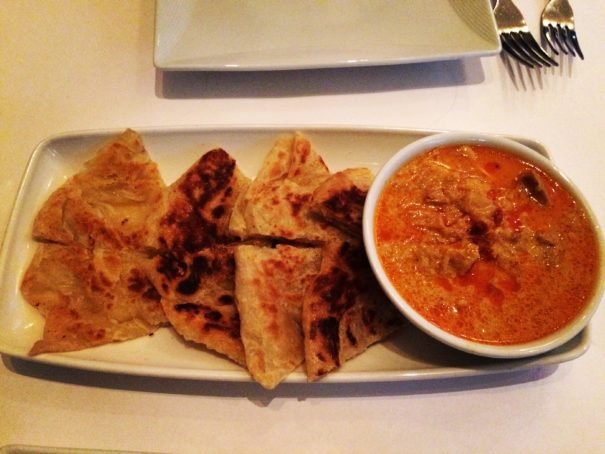
The Soothing Familiarity of Curry‑Scooping Bread

The Soothing Familiarity of Curry‑Scooping Bread
Palata in Yangon
After walking around Yangon’s famous Shwedagon Pagoda, I found streets overflowing with roadside eateries and barking dogs, my stomach growling under the burning sun. Plastic stools, street hawkers, and endless rows of restaurants crowded the roads of Burma’s business capital.
The restaurant I landed in had the perfect morning snack that I fashioned into a breakfast: buttery flatbread known as palata, accompanied by a warm bowl of spicy, curried coconut chicken.
Palata—the Burmese interpretation of the Indian paratha bread—is comfort food for me. I grew up eating roti and paratha every day, but I never imagined I would find something this similar to my Pakistani mom’s paratha in Southeast Asia. Cut into small triangles, soaked in a vat of spicy coconut chicken curry, paratha is a South Asian specialty with a similar culinary lineage in Burma.
When my mother makes roti or paratha by hand, it’s usually over a flame under a black tuvva, a type of heating plate popular in Pakistan. First, she rolls the dough into a circle, then slaps it between her palms like pizza dough, and then gingerly lays it over the tuvva to sprout brown or black spots indicating that it’s done. She usually provides a hearty protein dish to sink the roti or paratha into, which can be a moist cut of goat or a bowl of curried lentils. In Burma, the palata is also used as a vehicle to scoop up chicken or other proteins, but it’s a lighter food item. In triangular form, it looks like a less crispy version of a chip.
Palata is also excellent as a mopping agent for all sorts of hot curries that burn one’s tongue. The word “palata” is also similar to the Hindi and Urdu word “paratha,” a strong indication of a common heritage.
In South Asia—a region perennially cleaved by language, caste, and ethnicity—there is a salve in knowing we consume the same flavors. So, it’s also comforting for me to eat palata in Burma, to see familiar food translated across borders. In that Yangon restaurant, I was both jolted and soothed by the unfamiliar.